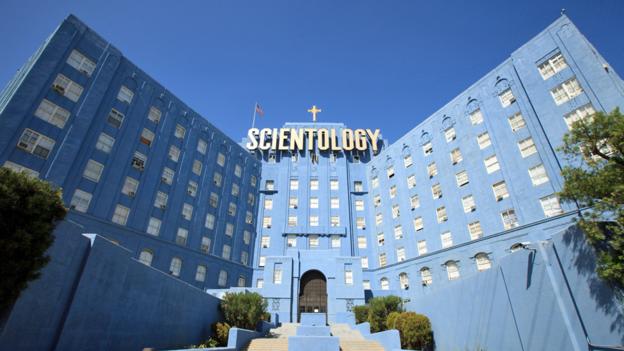Like a lot of people in mainstream society, most of what I knew about Scientology was limited to recent headlines about their abuses. I knew about its founding by a science-fiction writer, I knew about its high-profile celebrity members, and I knew that it's anti-psychiatry, anti-gay, and that it bleeds its members dry financially. But that's about it. So, I had two big questions going into Alex Gibney's documentary, Going Clear: Scientology and the Prison of Belief (based on a book by Lawrence Wright). Why do people join this organization and stay in it? Why does Scientology get beat up for having all these wild and wacky beliefs, while other religions get a pass on having equally improbable assertions?
These questions are addressed in the movie, but only briefly. Basically, people join because it seems like a decent method of effecting positive change in the world and of self-improvement. Dissatisfied members stay because if they leave, there's a good chance that their family and friends will "disassociate" from them, and they'll lose their entire support system. As to the second question, it's true that other organized religions certainly have their problems, but there are two important distinctions:
1) Other religions are religions because they have actual belief systems; they didn't become religions just to avoid paying taxes.
2) Other religions lay out their rules and rituals up front and at no cost. You can be a Muslim or a Christian or Jew without giving a dime to anyone, and you'll have full access to all of the information about what your beliefs entail, according to the organization. In Scientology, you have to earn knowledge. And you earn it by giving them money.
The great majority of the movie's running time is spent on exposing just how corrosive the Church of Scientology is to its members, its ex-members, and its critics. So, I guess it says something that even though my questions weren't given enough attention, I was still riveted and horrified.
The interviews given in this movie are not from casual ex-members of Scientology. These people attained high levels of power within the church. They know what they're talking about, and the stories they tell, from losing their family members to disassociation, to shocking tales of physical abuse and neglect, to the harassment and stalking they endured when they finally broke free are infuriating. How can you tell this information is reliable? How about the more than 100 lawyers that reviewed everything presented, to make sure the filmmakers would be insulated from the notoriously litigious church?
Going Clear also takes Scientology's celebrity spokesmen to task, suggesting that John Travolta and Tom Cruise could save a lot of lives from being ruined if they would stop shilling for Scientology, but that they're too enamored of the perks that the church lavishes upon them. A lot of disgust is also understandably directed at the IRS, who waved the white flag about allowing Scientology tax-exempt status, basically because they were incredibly lazy and wanted to avoid a hassle in the courts.
As I get older, I'm becoming increasingly impatient with the behavior of organized religions. But the one thing I can allow for even the most violent and bigoted Christians and Muslims is that at least they believe in their convictions. It doesn't excuse their actions, but it helps explain them. When it comes to Scientology, Going Clear makes it plain that its motivations are money and power. As a movie, it's nothing extraordinary. But as evidence that the practices of Scientology are a problem that society can and should solve, it's essential.
Going Clear: Scientology and the Prison of Belief: B+
Subscribe to:
Post Comments (Atom)




0 comments:
Post a Comment